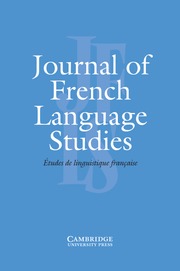Article contents
Evidence for suffix cohesion in French
Published online by Cambridge University Press: 10 September 2020
Abstract
In a language, suffix cohesion refers to the fact that suffixed words behave phonologically as simple or complex units depending on the suffix they are built with. This article uncovers a previously undescribed pattern of suffix cohesion in French, where words suffixed with vowel- and glide-initial suffixes behave phonologically like simple units (e.g. fêtiez [fet-je] ‘you partied’) and words built with other consonant-initial suffixes behave phonologically like complex units (e.g. fêterez [fɛt-ʁe] ‘you will party’). The evidence comes from a reassessment of well-known data on [ə]–[ɛ] stem alternations and from an acoustic study of [e]–[ɛ] and [o]–[ɔ] alternations in suffixed words as pronounced by 10 speakers living in the Paris area. The suffix’s phonological shape is found to provide the best account of the data among a set of factors that have been argued to be relevant to suffix cohesion in other languages (in particular resyllabification). The French pattern has important theoretical implications for theories of suffix cohesion as it is not prosodically conditioned. An alternative analysis in terms of paradigm uniformity is proposed, where suffixed words are treated as complex units phonologically if the suffix’s phonological shape facilitates the perceptual recognition of the base corresponding to the suffixed word’s stem.
Information
- Type
- Article
- Information
- Copyright
- © The Author(s), (2020). Published by Cambridge University Press
Footnotes
For very helpful feedback and discussion, I would like to thank the editor, the associate editor, and three anonymous reviewers. For comments on earlier versions of this work, I am also thankful to Adam Albright, Ewan Dunbar, Edward Flemming, Michael Kenstowicz, Donca Steriade, the participants in the Atelier de phonologie at Paris 8 University, and the participants in the 2019 École d’été en phonologie de corpus at the University of Lausanne. This work was presented at the Workshop on phonological variation and its interfaces held at the University of Barcelona in 2018, at the 16èmes rencontres du Réseau Français de Phonologie held in Paris in 2018, and at the 2018 Manchester Phonology Meeting. All errors are my own.
References
REFERENCES
- 2
- Cited by


